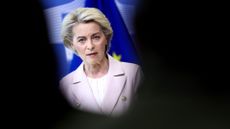French presidential election: Macron now faces economic test
Landslide victory will be pointless if En Marche! leader fails in his reform plans, warn experts

Emmanuel Macron won a landslide victory over far-right candidate Marine Le Pen in the French presidential election yesterday, but questions are being raised over his ability to follow through on his election pledges.
"Many analysts are already saying that if [he] fails to deliver on economic promises over the next five years, then the challenge from the National Front could be even stiffer come the 2022 election," says the BBC.
Macron spent three years as economy minister during the presidency of Francois Hollande and is a former investment banker, so "his economic credentials formed a big part of his campaign".
Subscribe to The Week
Escape your echo chamber. Get the facts behind the news, plus analysis from multiple perspectives.

Sign up for The Week's Free Newsletters
From our morning news briefing to a weekly Good News Newsletter, get the best of The Week delivered directly to your inbox.
From our morning news briefing to a weekly Good News Newsletter, get the best of The Week delivered directly to your inbox.
However, reforming France's stringent labour laws has beaten many a president down the years.
Macron campaigned on a pledge to reform the single currency eurozone area, but his plans involve even greater integration in the form of "a common eurozone budget and a eurozone finance minister too".
In that respect, French voters have given a ringing endorsement of the European project that Brexit had seemed to imperil. The MSCI World index, the global benchmark index, hit a record high in the wake of the result.
"Everyone in the world who wants to believe in liberal democracy's capacity to regenerate itself will breathe a mighty sigh of relief," says the Financial Times's Tony Barber.
But Macron's trial will come at home - and this will prove arguably the greater challenge.
France's next president wants to make permanent tax cuts for businesses while cutting public spending, which he hopes to achieve by adjusting pension payments to better reflect contributions and cutting government jobs.
He also wants to liberalise employment laws so companies can negotiate deals with staff on hours and pay in an effort to reduce unemployment.
As with many presidents before him, Macron is facing the threat of strikes by unions, while his fledgling party En Marche! has a challenge ahead of it to get the parliamentary majority he needs to push his plans forward at next month's elections.
"Without a majority, he will have a less-convincing mandate for the pro-business measures, labour market reforms and overhaul of the state that form the core of his economic programme," says the FT.
Create an account with the same email registered to your subscription to unlock access.
Sign up for Today's Best Articles in your inbox
A free daily email with the biggest news stories of the day – and the best features from TheWeek.com
-
 Controversy is brewing over a lawsuit involving Hermès' luxury bags
Controversy is brewing over a lawsuit involving Hermès' luxury bagsTalking Points The lawsuit alleges the company only sells bags to people with a 'sufficient purchase history'
By Justin Klawans, The Week US Published
-
 Codeword: April 16, 2024
Codeword: April 16, 2024The Week's daily codeword puzzle
By The Week Staff Published
-
 The issue of women and conscription
The issue of women and conscriptionUnder the radar Ukraine military adviser hints at widening draft to women, as other countries weigh defence options amid global insecurity
By Harriet Marsden, The Week UK Published
-
 Labour shortages: the ‘most urgent problem’ facing the UK economy right now
Labour shortages: the ‘most urgent problem’ facing the UK economy right nowSpeed Read Britain is currently in the grip of an ‘employment crisis’
By The Week Staff Published
-
 Will the energy war hurt Europe more than Russia?
Will the energy war hurt Europe more than Russia?Speed Read European Commission proposes a total ban on Russian oil
By The Week Staff Published
-
 Will Elon Musk manage to take over Twitter?
Will Elon Musk manage to take over Twitter?Speed Read The world’s richest man has launched a hostile takeover bid worth $43bn
By The Week Staff Last updated
-
 France's Macron says he wants EU Russian oil and coal ban 'this week' after Bucha 'war crimes'
France's Macron says he wants EU Russian oil and coal ban 'this week' after Bucha 'war crimes'Speed Read
By Peter Weber Published
-
 Shoppers urged not to buy into dodgy Black Friday deals
Shoppers urged not to buy into dodgy Black Friday dealsSpeed Read Consumer watchdog says better prices can be had on most of the so-called bargain offers
By The Week Staff Published
-
 Ryanair: readying for departure from London
Ryanair: readying for departure from LondonSpeed Read Plans to delist Ryanair from the London Stock Exchange could spell ‘another blow’ to the ‘dwindling’ London market
By The Week Staff Published
-
 Out of fashion: Asos ‘curse’ has struck again
Out of fashion: Asos ‘curse’ has struck againSpeed Read Share price tumbles following the departure of CEO Nick Beighton
By The Week Staff Published
-
 Universal Music’s blockbuster listing: don’t stop me now…
Universal Music’s blockbuster listing: don’t stop me now…Speed Read Investors are betting heavily that the ‘boom in music streaming’, which has transformed Universal’s fortunes, ‘still has a long way to go’
By The Week Staff Published